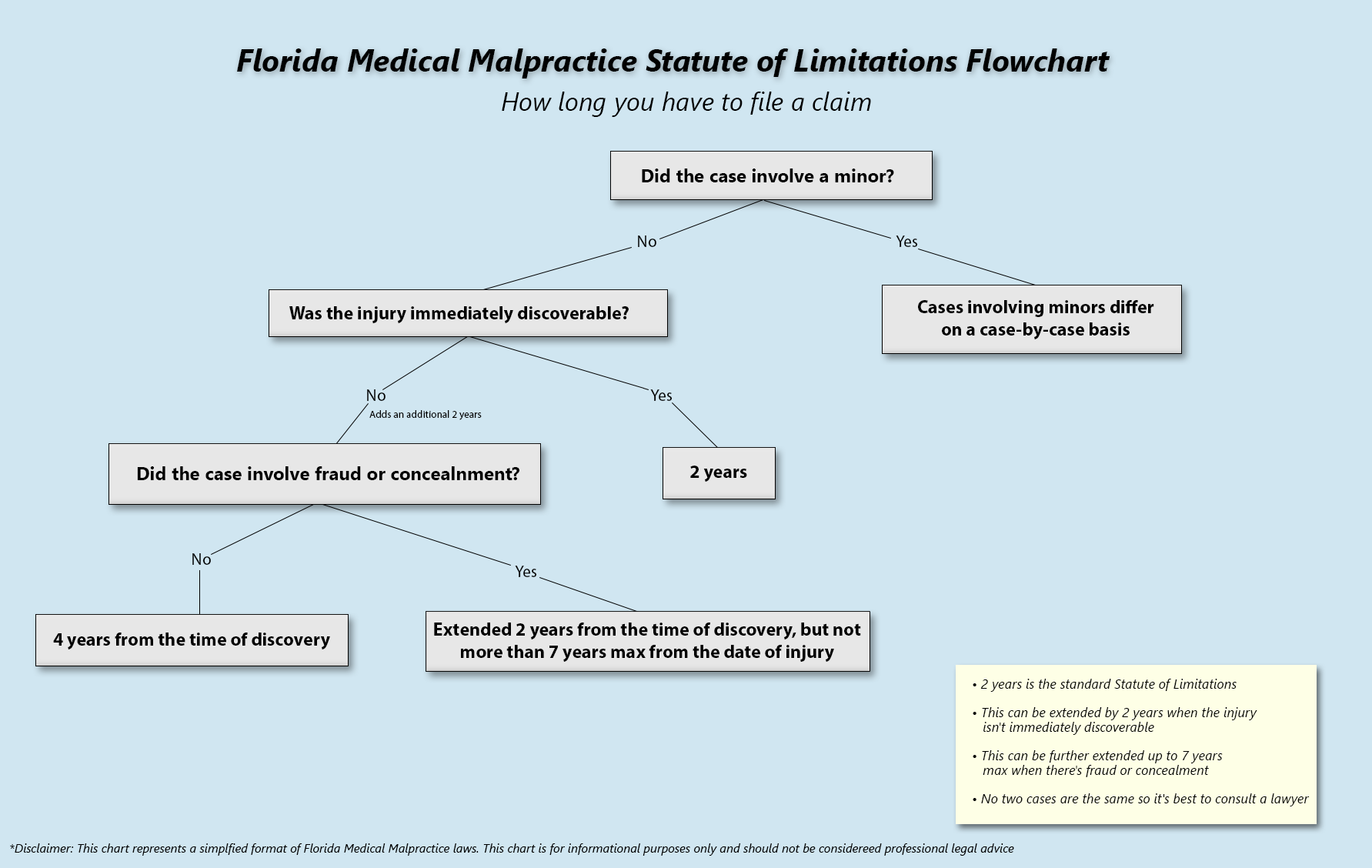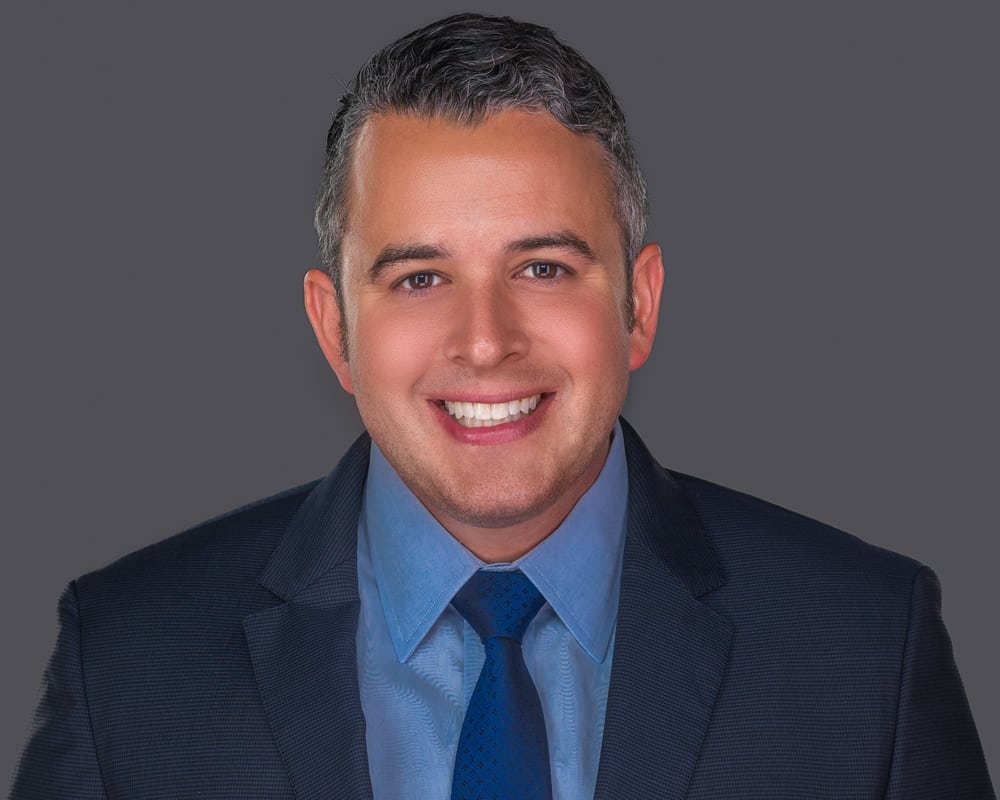FLORIDA MEDICAL MALPRACTICE ATTORNEYS
We rely on doctors, nurses, surgeons, and specialists to maintain and protect our health. As patients, we trust that these people are qualified by years of schooling and medical training, and that they will act appropriately and competently while performing their medical duties. Unfortunately, this is not always the reality of the situation. Doctors and other healthcare professionals routinely make devastating errors which result in serious injuries, avoidable illnesses, and in extreme cases, wrongful death.
If you were injured by a negligent or careless doctor, or if a loved one passed away after receiving substandard medical care, your family deserves a closer investigation into the matter. The medical malpractice attorneys of Di Pietro Partners have on staff a physician to review medical malpractice and wrongful death matters. To start exploring your legal options in a free and confidential case evaluation, call our law offices right away at (800) 712-8462.
Medical Malpractice Attorney David Di Pietro on National TV
What is Medical Malpractice? Do I Have a Case?
Needless to say, it’s important for claimants to understand how medical malpractice is defined from a legal standpoint.
Malpractice does not mean having pain or a negative outcome following a procedure which was performed appropriately in accordance with all normal industry standards. While having a bad outcome can be an immensely upsetting and frustrating experience, it cannot legally be considered malpractice if the doctor (or other healthcare professional) did not actually make any errors or mistakes.
In order for an incident to be successfully deemed true malpractice, there are several elements which must be in place:
- There must be a formal patient-doctor relationship established between the plaintiff and the defendant. – This creates a formal “duty of care” from the doctor to the patient. (Note that taking casual advice does not constitute a formal patient-doctor relationship.)
- The doctor must breach his or her duty of care to the patient by acting negligently. – In a legal context, negligence means that the party at fault failed to live up to the normal standard of care that a reasonable person would expect under the same set of circumstances. In other words, if one doctor makes an avoidable error which any other reasonable doctor would have noticed and corrected – such as failing to sterilize tools, or to ask the patient about other medications they were taking – the doctor who made the error may be considered negligent.
- The doctor’s negligence must have caused an injury to the plaintiff.
- The plaintiff’s injury, caused by the negligent doctor, must have led to damages.
Depending on the specific details involved in a claim, a plaintiff may be able to recover compensation for damages such as hospital bills, lost income, and physical pain and suffering.
What Are Some Common Examples of Doctor Negligence and Malpractice?
Malpractice can manifest in many different ways, depending on factors like the patient’s health and the type of doctor or procedure involved. The following is a non-exhaustive list of some relatively common forms of medical and hospital negligence:
- Failure to monitor a patient’s oxygen levels while he or she is sedated. If a sedated patient is not closely monitored by a qualified anesthetist or anesthesiologist and an error occurs, he or she can aspirate vomit and can suffer brain damage, coma, and death.
- Failure to notice and diagnose, or misdiagnosing an apparent early-stage disease.
- Failure to count all tools used during a surgical procedure. When items are forgotten and are left behind inside of patients’ bodies, it is referred to as surgical object retention or a surgical error. Whether a forgotten object is a soft pad of gauze or a sharp pair of scissors, the end result can be blockage, organ damage, internal bleeding, or death.
- Practicing in a field for which the doctor is not actually licensed or qualified.
- Improperly sterilizing tools and equipment, including failure to wash hands and take other hygienic measures prior to an operation or examination.
- Incorrectly filling out a prescription, or making a medication error that results in death or injury to the patient.
- Failing to obtain a patient’s medical history and information regarding food, drug, and alcohol use. This can lead to deadly drug interactions and avoidable complications which should have been foreseen.
- Permitting unnecessary and dangerous delays in treatment, such as waiting too long to address a known infection or illness.
- In pregnancy-related cases, causing a birth injury to the baby and/or mother, such as accidentally cutting the baby with a surgical tool during a C-Section delivery.
- Physically or sexually assaulting a patient, or otherwise engaging in sexual contact, abuse, or harassment.
If any of these issues have affected you or a loved one, you should contact our medical malpractice attorneys immediately as you may be able to receive financial compensation for your suffering and your losses.
What Does a Medical Malpractice Lawyer Do?
A medical malpractice lawyer specializes in representing clients who have been harmed due to the negligence or errors of healthcare professionals. Their primary roles include:
Case Evaluation: They assess the details of the client’s case to determine if there is a viable claim for medical malpractice.
Investigation: This involves gathering medical records, interviewing witnesses, and consulting medical experts to build a strong case.
Legal Guidance: They provide advice on the legal process, the likelihood of success, and potential compensation.
Filing Lawsuits: If necessary, they file a medical malpractice lawsuit on behalf of the client, adhering to all legal requirements and deadlines.
Negotiation: They negotiate with defendants or insurance companies for a fair settlement.
Representation in Court: If the case goes to trial, they represent the client in court, presenting evidence and arguments to support the claim.
Advocacy: Throughout the process, they advocate for the client’s rights and interests, aiming to obtain just compensation for the harm suffered.
In short, medical malpractice attorneys navigate complex medical and legal issues to seek justice for clients who have suffered due to medical errors.
Types of Medical Malpractice Cases
The experienced team of medical malpractice attorneys at Di Pietro Partners has successfully handled a diverse array of case types. Drawing from our extensive practice, we have identified several prevalent categories of medical malpractice cases;
- Injuries Caused by Surgical Errors
- Issues Causes from Improper Treatment
- Child Birth Injuries
- Emergency Room Errors
- Misdiagnosis/Delayed Diagnosis
- Misdiagnosed Stroke
- Medication Errors
- Neurosurgical Errors
Florida Medical Malpractice Laws
Florida’s medical malpractice laws are designed to govern legal claims arising from alleged negligence by healthcare professionals. These laws establish the criteria for what constitutes medical malpractice, set forth specific procedures for filing claims, and regulate the potential damages that can be awarded to plaintiffs.
Key aspects include the definition of medical malpractice, which typically involves a breach of the standard of care expected from medical professionals, leading to patient harm.
The laws specify a statute of limitations for filing claims, ensuring cases are brought within a reasonable time after the alleged malpractice. Additionally, Florida law requires plaintiffs to provide a pre-suit notice and obtain an expert affidavit to proceed with a claim.
These laws also address damage caps, although recent court rulings have adjusted their applicability. Furthermore, the laws detail the role of arbitration in resolving disputes and the qualifications for expert witnesses in malpractice cases.
Overall, Florida’s medical malpractice laws aim to balance the rights of patients to seek compensation for negligence with the protection of healthcare providers from unfounded claims.
If you’d like to read a more detailed summary of these laws, refer to our comprehensive article on Florida Malpractice Laws.
Standard of Care
All medical professionals in the State of Florida must follow a reasonable “Standard of Care.” This means that regardless of where the doctor is located, they must give the same level of care given to any other patient under similar circumstances. For instance, a doctor in Miami must give the same standard of care that a doctor in Tampa provides his/her patients for a similar procedure. If an individual feels as if they are not given a reasonable standard of care that has resulted in injury or unnecessary suffering, they may have grounds for a malpractice suit. This is specifically defined under Florida Statute 766.101, which states that:
“The prevailing professional standard of care is that level of care, skill, and treatment which, in light of all relevant surrounding circumstances, is recognized as acceptable and appropriate by reasonably prudent similar healthcare providers.”
As an example, if a patient were to come into the Emergency Room complaining of lower right abdominal pain, the prevailing reasonable standard of care would be to press on the abdomen to check for rebound pain. Afterwards, the doctor would order blood work to check the white cell count, and a CT scan, Ultrasound, or X-ray. This would be considered the proper way to rule out appendicitis or other lower abdominal issues and fall under a reasonable standard of care.
However, imagine in the same scenario another doctor that simply tells the patient, “it’s probably just gas pains, you’ll feel better in a few hours.” Then, the doctor sends the 20 year old home without running diagnostic tests and the patient’s appendix ruptures, placing them in a life threatening situation from the resulting infection. In this alternative situation, because the second doctor did not provide what would be considered a reasonable standard of care, they may be sued for malpractice.
Medical Device Injury
If your injury was caused by a surgically implanted medical device such as a metal hip replacement or IVC filter, you may be entitled to compensation from the device manufacturer. Certain devices have been shown to carry an unnecessary high risk of injury in patients. As a result, manufacturers of these products are facing mass litigation by affected individuals.
Di Pietro Partners is pursuing cases against certain manufacturers of defective medical products. You can read more about the individual products and manufacturers our Law Firm is pursuing cases against within the link below.
List of defective medical devices.
It’s important to note, if you were injured by one of these products anywhere in the United States, we may be able to take your case and ensure you receive compensation.
Florida Malpractice Act & Statute of Limitations
Florida’s series of complex Medical Malpractice Laws can be difficult to navigate and understand. The Florida Malpractice Act places the burden of proof upon the plaintiff to prove a medical professional was in fact negligent. In order to do this, another medical professional from the same field will be needed to testify for you. Additionally, causation must be proved, meaning that there must be proof that the medical professional’s actions or failure to act was the cause for your injuries.
On top of this, the State of Florida has a statute of limitations on malpractice cases. According to the medical malpractice statute in The Florida Legislature: (2018)
“An action for medical malpractice shall be commenced within 2 years from the time the incident giving rise to the action occurred or within 2 years from the time the incident is discovered, or should have been discovered with the exercise of due diligence; however, in no event shall the action be commenced later than 4 years from the date of the incident or occurrence out of which the cause of action accrued, except that this 4-year period shall not bar an action brought on behalf of a minor on or before the child’s eighth birthday…” (Section 95.11 7b)
In other words, in many cases, there is a 2-4 year statute of limitations on malpractice claims in Florida with several exceptions (i.e. a minor child was involved). Furthermore, cases involving fraud, intentional misrepresentation, or concealment carry a 7 year maximum limit on filing a claim. As a result, it’s imperative to have your case reviewed by our legal and medical professionals as soon as possible.
Because of this limited time window, it is absolutely critical that you hire an experienced medical malpractice attorney to investigate your case as soon as possible.
Malpractice Monetary Damages
In Florida, Medical Malpractice cases involve two types of monetary damages: economic damages and non-economic damages. Non-economic damages include emotional distress, pain and suffering, lost companionship, disfigurement, and loss of quality of life On the other hand, economic damages include, medical costs, lost wages, and future wages. For example, if your medical malpractice case involves a permanent injury that prohibits you from ever working, this fact is considered when awarding economic damages. Specifically, a lost limb, blindness, brain damage, or any other permanent disability caused by a healthcare provider’s negligence falls under the economic damages category.
The State of Florida does not place caps on damages resulting from medical errors.
Medical Malpractice Attorney FAQs
This section provides answers to commonly asked questions in relation to medical malpractice in the State of Florida. Visit our medical malpractice FAQ page for a full list of attorney answers to commonly asked questions.
-
Q. What is medical malpractice?
Medical malpractice, from a legal perspective, is not simply about experiencing pain or a negative outcome following a medical procedure. Instead, it’s about proving that a healthcare professional made a mistake or error during your treatment, which they should have reasonably avoided. For an event to be legally classified as medical malpractice, certain conditions need to be met:
- A formal patient-doctor relationship must exist
- The doctor must have breached their duty of care
- The negligence must have caused injury
- The doctor’s negligent actions must directly result in harm to the patient.
- The injury must have led to damages
-
Q. What is the statute of limitations on medical malpractice?
According to Florida Statute 95.11(4)(b), a person must file a medical malpractice lawsuit within 2 years of the date the harm from the malpractice was discovered, or could reasonably have been discovered. With that said, The statute of limitations on medical malpractice in Florida is not always cut and dry; various factors are involved in determining the amount of time someone has to file a suit. For instance:
- The two year statute of limitations may be extended to four years in cases where an action was not immediately discoverable.
- Cases of fraud or concealment allow exceptions to the two year rule. In fact, once the fraud or concealment is discovered a patient has an additional two years from the time of discovery.
- The statute of limitations in regards to minors follows different guidelines and is determined on a case-by-case basis.
-
Q. How do you find a medical malpractice attorney?
Finding a medical malpractice attorney can be as easy as conducting an online search for “medical malpractice attorney near me;” With that said, finding a qualified and experienced medical malpractice lawyer is critical to your case’s success. As a result, it’s important to research and compare options rather than calling the first one you see.
How Much Does a Medical Malpractice Attorney Cost?
The cost of a medical malpractice attorney varies and typically depends on several factors, including the complexity of the case, the attorney’s experience, and geographic location. Medical malpractice attorneys often work on a contingency fee basis, meaning they charge a percentage of any settlement or award obtained, rather than an hourly rate. This percentage can range from 20% to 40%, commonly around 30-33%.
Some attorneys may also charge for additional costs such as filing fees, expert witness fees, and other expenses associated with building a case. It’s important to discuss all potential costs and fee arrangements upfront with your attorney to understand the financial obligations involved.
The medical malpractice lawyers at Di Pietro Partners do not charge a consultation fee for medical malpractice cases. In addition to a free consultation, we also charge no fees until the case is settled. Once we’ve obtained a settlement or verdict for your case, our lawyers generally take 30% of the settlement amount obtained.
Speak With Our Medical Malpractice Attorneys
Di Pietro Partners offers a wide range of skills to tackle the complexities of medical malpractice cases. With a board certified physician on staff, and experience representing both plaintiffs and defendants in complex healthcare/malpractice cases, we’re well equipped to represent you.
The main offices of Di Pietro Partners are located in Fort Lauderdale with satellite offices in Miami, West Palm Beach, and other locations. Our lawyers serve clients all across the State of Florida as well as out-of-state clients whose injury occurred within Florida.
Contact one of our experienced medical malpractice attorneys today for a free consultation.








